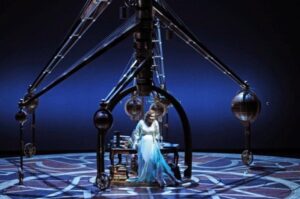
Opera Profile: Kaija Saariaho’s ‘Émilie’
By John Vandevert(PC: JP Maurin)
Émilie is a 75-minute, nine-scene opera by the Finnish composer Kaija Saariaho which takes its plot from the historical figure Marquise Émilie du Châtelet (1706-1749), polyglot and mistress to famous French philosopher François-Marie Arouet (or Voltaire).
The work, while its own opera, is to be considered related to Saariaho’s 2006 oratorio La Passion de Simone. The work has remained on-stage, in 2020 being performed at Peabody Conservatory by Elizabeth Futral.
Foregrounding Chatelet’s difficulties in navigating her intellectual development with her romantic interests, the opera takes her promotion of Isaac Newton’s discoveries and places it against the fact that she died in childbirth. Having literally become a symbol of the sacrifice women must endure at the hands of nature, Sarriaho cast the woman as someone stuck in between worlds. Even though Chatelet loved the fine things in life, she also loved to deepen her intelligence. Thus, she was being held between two worlds that seemed to pull her in opposite directions.
The opera was written in 2008, although conceptions about a soprano-only work started as early as 1998. The work began by preparing the libretto, written by Lebanese-French librettist Amin Maalouf. Musically, the harpsichord plays a leading role as it echoes the conventional instrumentation that most 18th-century French elites would have heard and had access to during the period. It also acts as the voice of Chatelet via the use of real-time electronic manipulation.
It had its premiere in 2011 at the Spoleto Festival alongside other notable composers like Gian Carlo Menotti and Wolfgang “Amadeus” Mozart. Reviewers raved about the work’s innovative look at the complex relationship between mankind and nature, The New York Times writing it was “a tour de force for soprano” as the soprano is forced to practically sing without end for 75 minutes. Other reviewers were also wowed by the work.
Listen
Categories
Opera Wiki

